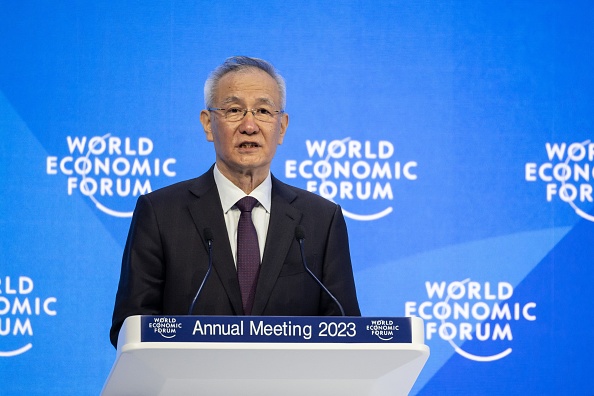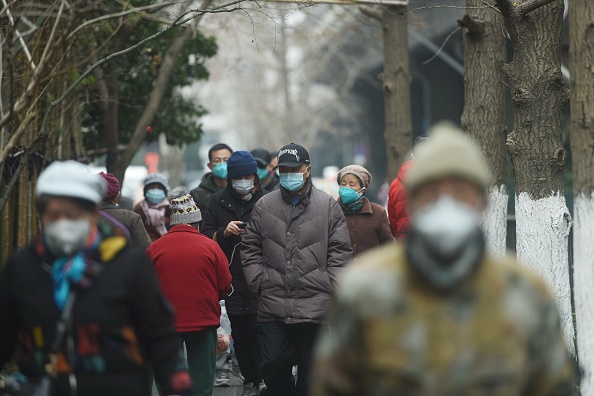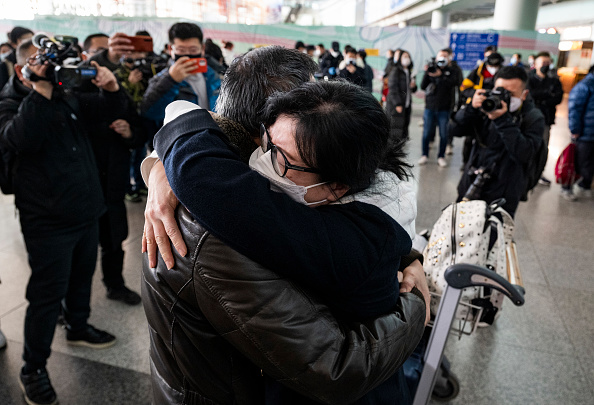
 China's Davos Pitch
China's Davos PitchChinese Vice-Premier Liu He and U.S. Treasury Secretary Janet Yellen held their first face-to-face meeting in more than two years, as both countries seek to minimize bilateral tensions. The leaders agreed to enhance communication over macroeconomic and financial issues and to increase coordination over climate change. The U.S. delegation described the meeting as "candid, substantive and constructive."
At the World Economic Forum meetings in Davos, China's Vice-Premier Liu He privately wooed a group of top corporate executives with the declaration that China has returned to the world stage after three years of pandemic isolation. Liu said China is welcoming foreign investment and implored international investors to help Beijing revive its slowing economy.
Projecting renewed optimism, Liu's pitch made it clear China wants to jumpstart growth and adhere to five principles: "placing economic growth as top priority, utilizing market mechanisms, opening up to all directions, governing by rule of law including intellectual property protection, and promoting innovation." Days before his appearance in Davos, China confirmed its annual real economic growth was 3% in 2022, far below the official target of around 5.5%.
He also repeatedly called on countries to improve diplomatic ties "to firmly safeguard world peace" and added that Beijing opposed unilateralism and protectionism. To tackle cross-border issues, such as climate change, energy crisis, food security, and slowing global growth, Liu stressed, "traditional thinking patterns will not provide an exit."
"We have to abandon the Cold War mentality, try to understand the essence of things from the perspective of material duality, endeavor to build a community with a shared future for mankind, and join hands to respond to global challenges," Liu said, according to a translation. "We believe that an equitable international economic order must be preserved by all of us."
 A New Era
A New EraChina's population fell last year for the first time in six decades, a historic turn that is expected to mark the start of a long period of decline in its population with huge implications for China's economy and the world. Experts have noted that China's population reached its peak in 2022, which was earlier than expected, and is now entering an "era of negative population growth."
As China's population continues to age, the country's shrinking labor force signals a potential downturn in manufacturing strength, despite government efforts to reverse the trend.
Following 36 years of a one-child policy that punitively discouraged having multiple children, China's government in 2016 started encouraging people to have more children by offering financial and social incentives via subsidies and tax breaks. Some provinces or cities have even announced cash payments to parents who have a second or third child.
However, most couples are actively resisting having more children due to concerns over cost of living. In the long-term, U.N. experts see China's population shrinking by 109 million by 2050, more than triple the decline of their previous forecast in 2019.
Read more in "Implications of an Older Population," by Li Zheng, an Assistant Research Professor at the China Institutes of Contemporary International Relations.
 An Uphill Battle
An Uphill BattleChina is continuing to battle the spread of COVID-19 and just this week reported the first major death toll released since the country stopped its zero-COVID policy. According to officials, there were roughly 60,000 COVID-related deaths between December 8th and January 12th. They also noted that most of those who died were over 80 and experiencing underlying conditions.
The update in numbers comes after the World Health Organization warned that China was drastically underrepresenting the number of people dying from the respiratory virus and that the way it categorized COVID deaths was too narrow.
Jin Dongyan, a virologist at the University of Hong Kong, said the revision to China's death toll "should be the first step towards a more timely, open and transparent sharing of COVID statistics (between) China and the world."
While health authorities have also said that the number of COVID patients needing critical care in China's hospitals has peaked, there are growing concerns of fresh outbreaks, as millions will be traveling across the country this week for Lunar New Year celebrations. Not only is Lunar New Year a peak travel time in China, but this is also the first celebration without COVID restrictions, allowing families dispersed across the country to reunite, some of them for the first time since the pandemic began.
Prepared by China-US Focus editorial teams in Hong Kong and New York, this weekly newsletter offers you snap shots of latest trends and developments emerging from China every week, while adding a dose of historical perspective.
- 2023-01-13 Strategic Encounters
- 2023-01-06 Common Challenges
- 2022-12-23
- 2022-12-16 All in On Africa
- 2022-12-09 Seeking Stabilization
- 2022-12-02 Turf Tension
- 2022-11-18 Thawing Ties?
- 2022-11-11 Face to Face
- 2022-11-04 The Pacing Challenge
- 2022-10-28 Third Time’s the Charm
- 2022-10-21 United as Steel
- 2022-10-14 Party Time
- 2022-10-07 Elections Incoming
- 2022-09-30 Hot Intrigue
- 2022-09-23 Global Gridlock
- 2022-09-16 Injecting Stability
- 2022-09-09 Cutting Edges
- 2022-09-01 A Win for Global Business
- 2022-08-26 A Heavy Price
